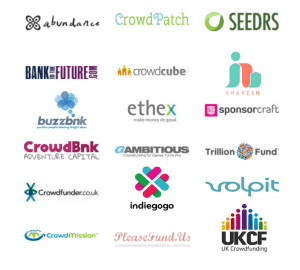 Crowdfunding, and in particular crowdinvesting, is the result of deep dissatisfaction, anger even, at where our financial services industry has delivered us today.
Crowdfunding, and in particular crowdinvesting, is the result of deep dissatisfaction, anger even, at where our financial services industry has delivered us today.
The financial crisis brought people onto the streets in protest at the behaviour and lack of contrition from our mega financial institutions. Five years on we now have a choice to move our money to a very different high street where a whole range of financial innovations have sprouted and grown including crowdfunding.
We believe that the crowd is consistently poorly served by conventional financial institutions as evidenced by the flow of scandal and compensation in recent years. Crowdfunding is built for the crowd and largely run and controlled by the crowd.
 In some ways the timing is perfect – the banks in the UK just aren’t lending. They have neither the will, nor the capacity, to support small and medium size businesses (SMEs) that desperately need investment or loans to get off the ground, or to grow and diversify.
In some ways the timing is perfect – the banks in the UK just aren’t lending. They have neither the will, nor the capacity, to support small and medium size businesses (SMEs) that desperately need investment or loans to get off the ground, or to grow and diversify.
Crowdfunding is a much needed solution for both investors and investees.
Here’s the thing. Change isn’t easy.
It normally requires several elements to happen at the same time:
- high levels of dissatisfaction with the status quo
- relative ease of switching, and
- the incentive of a substantially better alternative to what we have today.
In the case of financial services, it is not made easier by existing incumbents who rely on doing things the old way while they earn a very healthy living, thank-you-very-much.
 But crowdfunding is helped by technology, transparency and by you and me, Joe Bloggs – the man in the street, working together to get things done. It is made possible by technology, which by its very nature is transparent, and as the deal only goes through if we all invest -and approve- together.
But crowdfunding is helped by technology, transparency and by you and me, Joe Bloggs – the man in the street, working together to get things done. It is made possible by technology, which by its very nature is transparent, and as the deal only goes through if we all invest -and approve- together.
So what could stop it? (unless you share Tim Draper’s view that the train has already left the station)
Innovation and competition is so badly needed in the financial services sector that the new UK regulator, the Financial Conduct Authority (FCA), has “effective competition” in its charter – right up there with consumer protection.
Their consultation (beginning in October 2013) on what the regulatory framework for crowdfunding should be will have a major impact on the industry as a whole, our individual businesses, and we would argue, the future of the UK economy.
 The new regulations could be the single biggest catalyst for the industry’s growth (after all don’t we all want the reassurance that someone is checking if our money is being looked after properly) provided it is appropriate and proportionate.
The new regulations could be the single biggest catalyst for the industry’s growth (after all don’t we all want the reassurance that someone is checking if our money is being looked after properly) provided it is appropriate and proportionate.
Or the regulations could become the biggest obstacle if they make it too expensive and time consuming for platforms to become authorised – or if the restrictions placed on self-directed investors mean that the majority of people who could benefit from crowdfunding find they are excluded, leaving accessibility to these investments as it is now – for wealthy people and big institutions only.
This is about the 95% who don’t currently have access to finance and investment opportunities, not the 5% that have.
As someone who is closely engaged with the FCA I can say I have been impressed by how open the dialogue has been and how accessible we have found both the investment policy and authorisation teams.
The key sensitivity in all our discussions both with regulators and the wider financial services community seems to be around whether the general public should be “allowed” to participate in equity based crowdfunding.
My view – and this is one shared by the twenty operating platforms in the UKCFA – is that provided people can understand the risks they are taking when they invest, then the regulator should not stand in their way.
There are in fact a wide range of motivations for participating in crowdfunding and maximizing personal financial return is in some cases less of a motivation than wider social benefit.
Friends and family often want to support a new venture but don’t have the £20,000 they would need to invest via a Venture Capital Trust. With minimum investments at £50 or even in one case £5, there is an argument that this is an amount of money that people can afford to lose. After all we could gamble it away or give it to a performer in the street and no-one would bat an eye. And in both cases if we changed our mind I think the probability of getting that money back is pretty close to zero…
In the United Kingdom we benefit from a principles based regulatory regime. This structure allows for the flexibility for each business to be considered on its own merits. Authorisations are based largely on who the investors are, how the business is operated, the investment vehicle or product, and the end asset that people are investing in.
No two crowdfunding platforms are the same, this is a diverse industry, and I expect that diversity will only increase as many of us choose to invest in what we know or love.
So I really hope the official consultation continues to be principles based and doesn’t seek to impose fixed Rules across all crowdfunding businesses. The process of getting authorized can be made clearer, and therefore faster and less reliant on expensive lawyers and consultants. And permissions should not overly restrict who can invest and certainly not restrict them on the basis of how rich they are. The amount of money I have to invest is no indication of my ability to assess an investment or to understand risk. Wealth is not a skill set. Let’s keep the crowd in crowdfunding.
Proportionate and appropriate regulation is what the industry wants and if done correctly we think it will facilitate a change for good. Watch this space.
_________________________
Guest Contributor Julia Groves is the Chair of the UK Crowdfunding Association, and Managing Director of Trillion Fund a crowdfunding platform allowing people to directly invest in clean energy infrastructure such as solar and wind energy.

